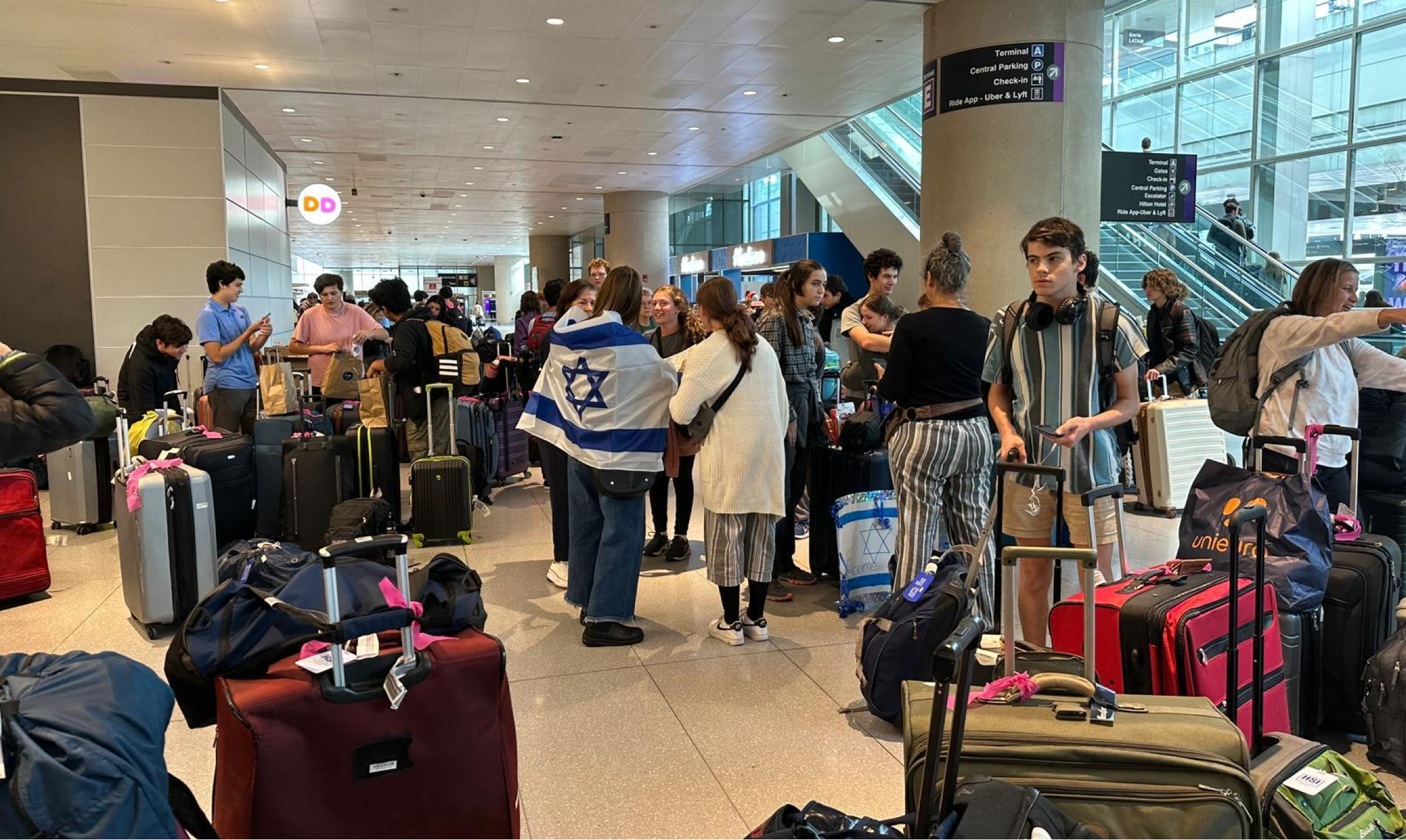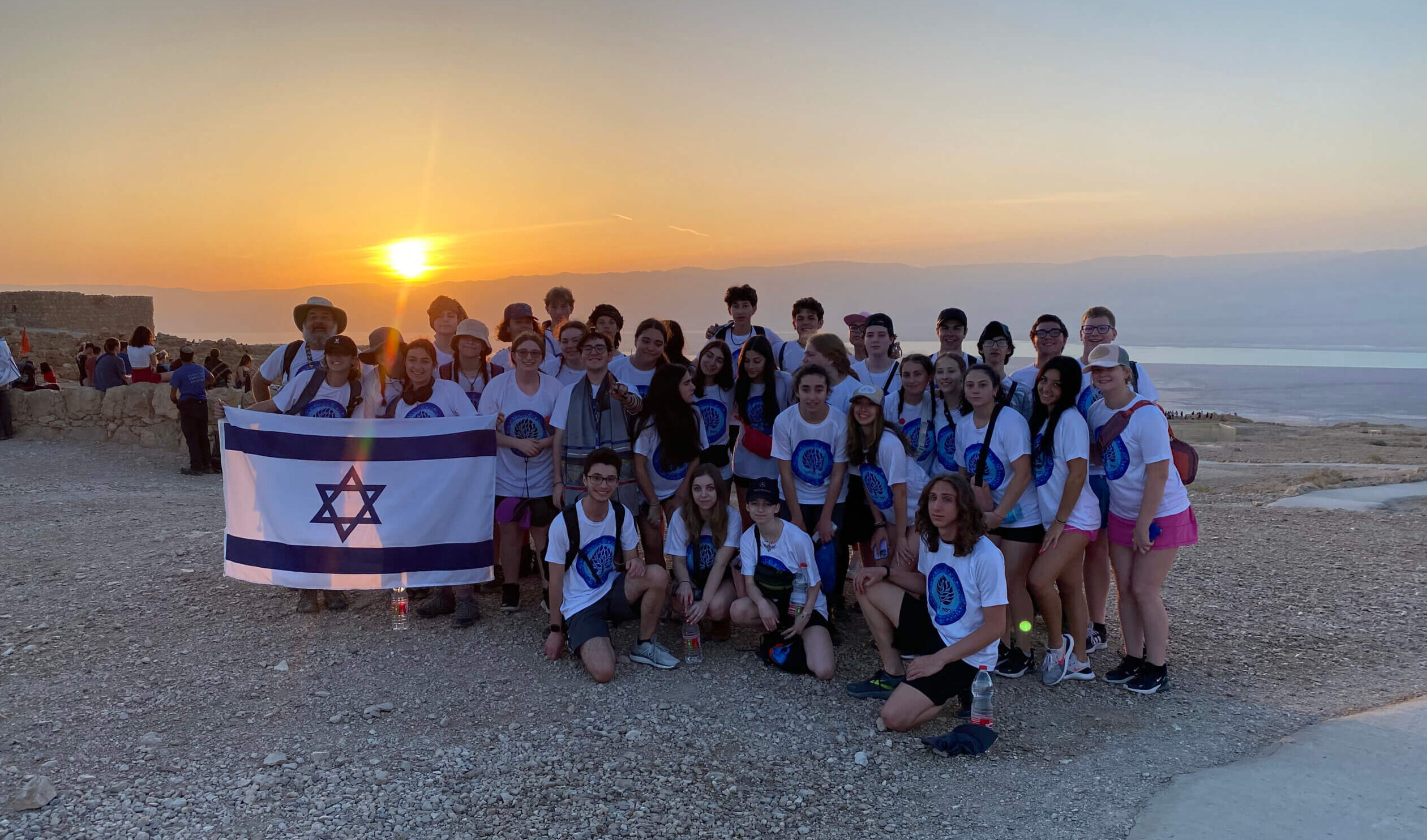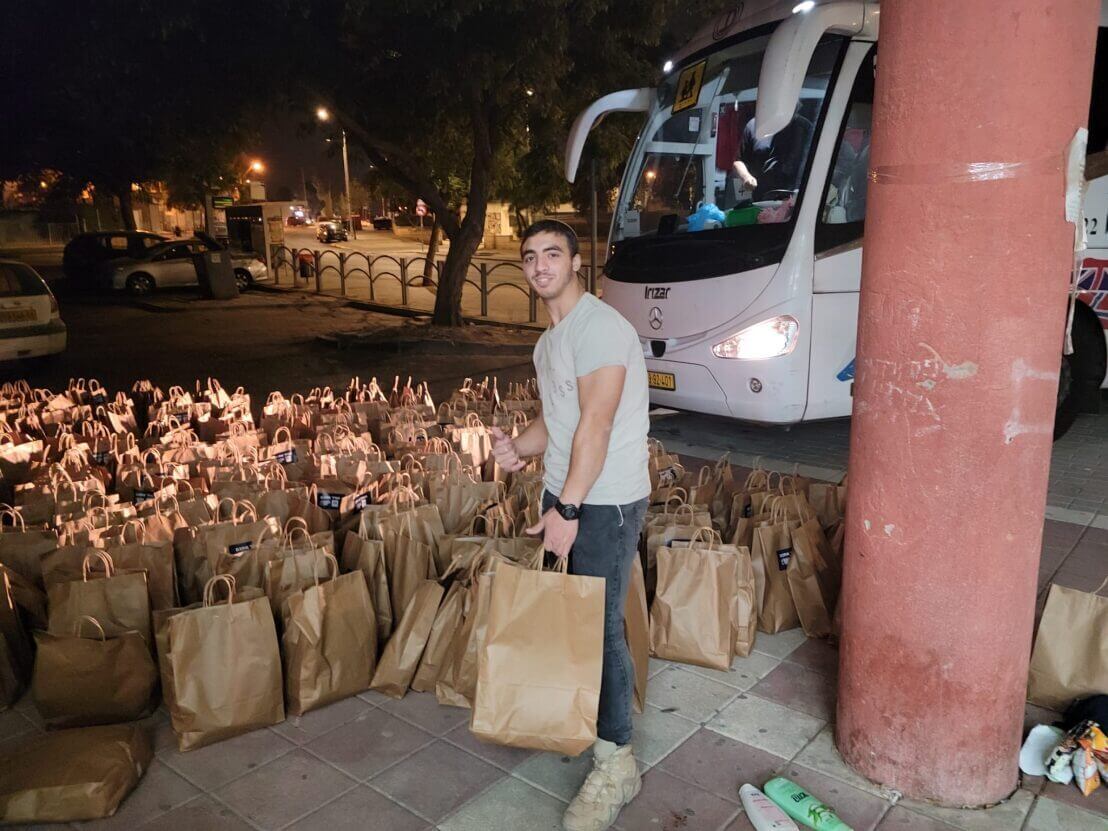As the war rages on, Jewish day schools still plan to send students to Israel
Schools committed to the trips in the coming months are assuring families that they are building in extra security precautions, and adjusting itineraries to steer clear of the fighting

Graphic by Angelie Zaslavsky
For many students, it’s the highlight of a Jewish day school education: spending the last semester of high school in Israel. But since Oct. 7, these schools and the families they serve have wondered, amid Israel’s war with Hamas, are these monthslong trips going to happen? And if they do, will students be safe?
At the outbreak of the war, many international students in Israel, including many Americans, evacuated to their home countries. But day schools’ trips often take place in the spring, which has given administrators and parents time to assess risk.
“What we are hearing is that Jewish day schools are determined to go ahead with Israel trips this year, if it is safe to do so,” said Paul Bernstein, CEO of Prizmah, a network of 326 Jewish day schools and yeshivas in North America. “They see the immense educational value and the connection to Israel that comes from time spent in the country.”

Several schools have already taken groups of students and parents to Israel within the last two months, Bernstein added, showing “their commitment to deepen their connection to Israel.”
Of Prizmah’s member schools, about 80 advertise capstone trips to Israel — many of which take place in the second semester of 12th grade but some in the eighth grade if the school has no high school. Some schools also organize shorter trips for younger students.
Schools committed to the trips in the coming months are assuring families that they are building in extra security precautions, and adjusting itineraries to steer clear of the fighting. Hamas is still firing rockets into Israel. But many parents of Jewish day school students have themselves spent time studying or working in Israel and in Israeli bomb shelters, and understand the risk as part of life there.
In the midst of war, here’s how three Jewish days schools are thinking about and planning student trips to Israel.
Charles E. Smith Jewish Day School — Rockville, Maryland
Parents of students at the Charles E. Smith Jewish Day School in Rockville, Maryland, an independent school that enrolls about 950 students, began asking about its capstone Israel trip just days after the Oct. 7 Hamas attack, said Rabbi Mitchel Malkus, the head of school.
The school has run the trip for over 40 years, including during the COVID-19 pandemic. This year’s trip is slated to begin in February, after graduation, and will happen, Malkus said, as long as he’s confident it will be safe and educational. Families, as in other years, will have the option to keep their students home.
Malkus said the school keeps in close contact with its partner school, Alexander Muss High School, near Tel Aviv, where his students study and live while in Israel. He said his school is committed to this trip despite unrest and uncertainty, and that its priority is to keep students safe.
Some parents are concerned, but most students — who have looked forward to the trip for years — are not, and the war has made many even more eager to go, said Malkus.
“Students, and we all have this feeling, are asking ‘How do we contribute?’ Malkus said. “‘How do we get involved when there is a crisis in a place that we care deeply about?’”
They can expect, he said, volunteer opportunities in Israel that will allow them to help Israelis directly.

Known as CESJDS, the school, one of the largest and most prestigious Jewish day schools in the country, garnered attention this week for a letter more than 100 alumni circulated about how their alma mater had fed them “false narratives” about Israel. The school replied that it exposed students to multiple narratives about Israel, but also affirmed its “pro-Israel and Zionist” identity.
Milken School — Los Angeles
Alexander Muss partners with other American Jewish day schools, including Milken Community School in Los Angeles. Milken students head to Israel in 10th grade for three months, and some also visit in other grades.
Sarah Shulkind, its head of school, said there’s no consensus among parents about this spring’s planned Israel trip but the school will likely go ahead with it.
“There’s a range of reactions everywhere from, ‘It’s more important than ever that we go,’ to ‘even if the school goes, I won’t be sending my own child,’” Shulkind said.
“I would say the same for the kids,” she added. “I mean, there are students who have been thinking about this trip their entire time at Milken, and other students who are really unnerved by the news and by the state of affairs both in Israel and the United States.”
Frankel Jewish Academy — in West Bloomfield, Michigan
At the moment, Frankel Jewish Academy, a high school outside Detroit, still plans to send two groups of students to Israel. Eleventh graders will embark on an experiential learning trip at the end of the school year at the end of May for about two weeks, and the robotics team will head to the Technion-Israel Institute of Technology in March for a week.
Rabbi Azaryah Cohen, who leads the school, echoed Malkus’ sentiments about the particular significance of Israel trips during wartime.
“It’s forcing us to be more deliberate as we think about these trips,” Cohen said, but also highlighted the need for them. “I think at a time like this, our students need it as a Jews, and as Zionist supporters of Israel.”
Cohen, who lived in Israel in the 2000s and recalled widespread fear then over taking public transit, which had been targeted by suicide bombers, said he is ready to field parents questions about their children’s security.
“We collectively as a school recognize Israel, even Israel in war, is a safe place,” he said, “Certainly, there are parts of the country, and I would say there always are, where there may be greater risk to tourists.”
Alexander Muss High School — Hod HaSharon, Israel
On Oct. 7, when Hamas attacked Israel, the 120 foreign students living at Muss — including Americans, British and Australians — left for their home countries. Staff who are also reservists in the Israel Defense Forces left to serve, and the school has gone without students since then.
Muss Head of School Stephen Kutno said preparations are underway to welcome students to campus in January. The program will be fully staffed, though some activities may be modified to avoid parts of the country in both the north and south that are close to the war. Students may have less opportunity to explore on their own during field trips, and more medics and guards than usual will accompany them.
And those weekend trips to visit friends or family in Israel?
“At least in the short term, we are not going to allow students to sign out for the weekend,” Kutno said. “We’re going to keep them on campus. When they go into town, which they sometimes are able to do in the evening, they will be accompanied by our staff.”
The school will adapt to new realities, Kutno said. “Everybody is really itching to get back to some sense of normalcy.”





















